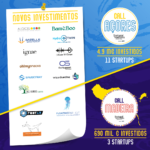
Lisbon, 16 June 2020 – As part of a set of measures put in place by the Portuguese government, and in close collaboration with its partners, Portugal Ventures launched three financing instruments to help Portuguese startups and the entrepreneurship ecosystem counter the impact of the COVID-19 pandemic. The new investments are expected to be finalised by the end of July.
The ecosystem’s response to these initiatives resulted in:
Call INNOV-ID – 117 applications submitted in just one month. Applications were submitted in a joint effort between entrepreneurs and the members of the Portugal Ventures Ignition Partners Network, with 36 Incubators, Accelerators, Universities, Clusters, R&D Centres and Interface Centres from across the country, including Madeira and the Azores.
Portugal Ventures’ goal is to bridge the gap between the national ecosystem and all active agents who are supporting and working with entrepreneurs in these exceptional times, and its mission has borne fruit. Two applications were submitted from the Azores, 1 from Madeira, 28 from the North of Portugal, 35 from Lisbon, 2 from the Alentejo region and 1 from the Algarve. But the greatest response came from the Central region, with a total of 48 applications submitted.
The entrepreneur profile varies, with 90 of the 117 applications submitted by local entrepreneurs and the remainder by those of Brazilian, British, French, Iranian, Italian, Mexican, Spanish and American and other nationalities. The age group of the promoters also varies. Fifty-six are aged between 31 and 40, and only 9 are younger than 26, while 15 entrepreneurs are older than 50.
Portugal Ventures hopes to invest in up to 40 projects under Call INNOV-ID.
Call INNOV-ID aims at investing in science and tech-based projects or companies with a proven direct or indirect impact on decarbonization of the economy, on process, product and material sustainability, on greater energy efficiency and sustainability or on boosting the circular economy.
Call FIT – 30 applications were submitted by finalists of the Fostering Innovation in Tourism Acceleration Programmes, 24 focusing on Tech Tourism and 6 on Non-Tech Tourism.
Most of the applications sent in to Call FIT were submitted by the finalists of the Tourism Explorers Programme, Madeira Startup Retreat and Fab Tur – Rumo ao Turismo 4.0, totalling 19 applications. Projects submitted to this call were received from 18 Portuguese entrepreneurs and 12 Brazilian entrepreneurs, with the remaining 4 projects sent in from countries such as the USA, Bulgaria, India, Italy and Russia.
Call FIT seeks to invest in the finalist tourism projects of the Fostering Innovation in Tourism Acceleration Programmes in the pre-seed phases, non-tech and tech. Call FIT aims to bridge the financing gap that startups find after the programmes have ended, giving impetus to innovative tourism-based projects and stimulating the entrepreneurship ecosystem by supporting the development of ideas and business models that offer new solutions for the Tourism sector.
Operation Follow-Ons – 14 projects have been selected for another round of investment, which is being coordinated with Portugal Ventures’ Capital Partners Network.
Together with its Capital Partners, Portugal Ventures identifies startups that, due to their potential for growth and ability to overcome the setbacks caused by the pandemic, need follow-ons to continue pursuing their business activities. No applications were received from the entrepreneur community under this initiative.
According to Rui Ferreira, Vice President of Portugal Ventures, “We are very pleased with how well the ecosystem has embraced the initiatives launched by Portugal Ventures in just under two months. We received applications from 161 resilient entrepreneurs who hope to leverage their businesses in these exceptional times. Portugal Ventures will fulfil its mission by investing in projects that will improve national competitiveness and help recover the Portuguese economy, but that also have the potential to go global by offering unique solutions to fill market gaps”.






